Music
UCAS code W300
- Entry requirements
- International Baccalaureate: 26 or 544
- HKDSE: 4,3,3
- India Standard XII: 60%
- View full requirements
- Study mode
- Full-time
- Duration
- 3 years
- Start date and application deadlines
-
- Start date
UCAS code W300
As one of the most vibrant musical cities in the world, and a former Capital of Culture, there is no better place to study Music than Liverpool. We are intrinsically connected to the city, working closely with musical and cultural partners, including the Royal Liverpool Philharmonic. This particular partnership extends across the spectrum of our activities, with the Orchestra’s musicians making frequent visits to campus to provide lessons, coaching, and workshops.
The BA Music develops an in-depth and critical historical understanding of classical music repertoires, cultures, and practices. Some modules are practical, concerned with musical performance, composition and orchestration, or creative music technology; while others focus on classical music history or music theory. There are also options in areas such as music psychology, audio-visual media (films and video games), and vocational options.
The nature of the programme will vary according to your module choices. In year one, core modules develop theory skills that will be useful for composition and performance, while the study of music history explores key musical milestones and the nature of music histories and how they are written. You will also have the opportunity to study or investigate areas that may be new to you (such as film music, jazz, technology, composition, world music and many more). Flexibility is our guiding principal, which means that you have a wide-range of modules to choose from that run the full spectrum of musical endeavour.
In your second and final years, you will focus in more depth on fewer selected topics, either concentrating solely on classical music modules or retaining the option to pursue one or two modules in technology or popular music if you wish. Specialist topics can be studied alongside advanced level historical, theoretical, performance or composition modules. In the final year, there is a particular emphasis on specialism and an extended or independent project (such as a dissertation, major composition portfolio or extended recital).
Undergraduate students in the Department of Music have the opportunity to spend a year in industry, either in their third year, or by adding a ‘follow-on year’ at the end of their academic studies. These are paid placements within an organisation in industry, broadly defined, and you will receive support from the Department and the School of the Arts to source and apply for opportunities. Find out more about the difference between these options, including how to apply.

We’re proud to announce we’ve been awarded a Gold rating for educational excellence.

We want you to feel welcome from the moment you apply to study at Liverpool. We offer lots of support for our students who are moving from abroad. We can welcome you at Manchester Airport with our meet and greet service (for September starts) and we have a friendly International Advice and Guidance team who run events to welcome you on to campus and provide in person support and events all year round.
Discover what you'll learn, what you'll study, and how you'll be taught and assessed.
In year 1, students:
•Must take at least one from: MUSI180, MUSI181
•May take a maximum of one from 104, 107, 140, 182 (Popular Music options)
•May not take both Classical Performance and Popular Performance.
Your optional modules must include either MUSI180 or MUSI181, and no more than one from MUSI104, MUSI140, and MUSI182.
You may not take both classical performance and popular performance.
| Compulsory modules | Credits |
|---|---|
| INTRODUCTION TO CLASSICAL MUSIC HISTORY (MUSI130) | 15 |
| MUSIC AS AN INDUSTRY (MUSI150) | 15 |
| MUSIC IN CONTEXTS: WHY MUSIC MATTERS (MUSI121) | 15 |
Programme details and modules listed are illustrative only and subject to change.
You will choose your modules from a wide range of options. If you are taking the year in industry pathway, you will be required to take SOTA260.
There may be some restrictions on which modules can be taken in conjunction with others, which will be explained during module registration.
Programme details and modules listed are illustrative only and subject to change.
You will undertake a major independent project in research, performance, composition or technology. The rest of your modules will be chosen from a range of options.
There may be some restrictions on which modules can be taken in conjunction with others, which will be explained during module registration.
Programme details and modules listed are illustrative only and subject to change.
In year one core modules look at classical music repertoire and analysis, while in years two and three you focus in more detail on the areas that interest you most (such as history, analysis, psychology, audio-visual, performance, or composition etc).
We employ a range of teaching methods, including lectures, seminars, tutorials, workshops, master classes, 1-2-1 instrumental lessons, ensemble coaching, and online tasks and projects. The emphasis is on student participation and interaction. We fit the most appropriate mode of teaching to the particular subject, conscious that the learning process needs to be enjoyable, enabling you to acquire useful and marketable skills and knowledge.
Each module has an individually determined system of assessment (by coursework, written paper, test, recital, composition or technology portfolio, presentation or podcast, examination, and combinations of these), and we select the method that best suits the nature of the module.
We have a distinctive approach to education, the Liverpool Curriculum Framework, which focuses on research-connected teaching, active learning, and authentic assessment to ensure our students graduate as digitally fluent and confident global citizens.
The Liverpool Curriculum framework sets out our distinctive approach to education. Our teaching staff support our students to develop academic knowledge, skills, and understanding alongside our graduate attributes:
Our curriculum is characterised by the three Liverpool Hallmarks:
All this is underpinned by our core value of inclusivity and commitment to providing a curriculum that is accessible to all students.
The qualifications and exam results you'll need to apply for this course.
| Qualification | Details |
|---|---|
| International Baccalaureate | 26 points overall with no score less than 4 including 5 in HL Music, or Pass the IB Diploma plus 5,4,4 in 3 HL subjects including 5 in HL Music. Plus a minimum of 5 in SL Maths or 4 in HL Maths and 5 in SL/HL English A or 7 in SL English B or 6 in HL English B |
| HKDSE | 433 from 2 electives (including 4 in Music) plus one core subject (excluding Citizenship and Social Development) and a minimum grade 3 in core Mathematics. Grade 4 (with no component less than 4) in HKDSE English Language |
| India Standard XII | Overall average of 60% from four core subjects including 75% in Music, a minimum of 75% in English dependent on exam board (not including Hindi, Regional Language, Environmental Education and PE) and a minimum of 50% for Standard X Maths |
Studying with us means you can tailor your degree to suit you. Here's what is available on this course.
University of Liverpool students can choose from an exciting range of study placements at partner universities worldwide. Choose to spend a year at XJTLU in China or a year or semester at an institution of your choice.
Immerse yourself in Chinese culture on an optional additional year at Xi'an Jiaotong Liverpool University in stunning Suzhou.
Broaden your world by spending an additional year of study at a partner university abroad following your second year of study.
Take a semester of your second year of study at one of our worldwide partner institutions.
Spend a summer abroad on a study placement or research project at one of our worldwide partner institutions.
Year in industry placements give you an in-depth workplace experience where you can develop your skills and apply your learning.
You don't need to decide now - you can choose to add a year in industry after you've begun your degree.
Learn more about year in industry
To spend a year in industry, you'll need to secure a placement with an organisation. If you're unable to find a placement, you'll continue with the standard version of the course without a year in industry.
Every student at The University of Liverpool can study a language as part of, or alongside their degree. You can choose:
With a combined degree, you can study two subjects as part of the same degree programme.
Much of your teaching will take place in the Department of Music. Our recently renovated facilities include studios, teaching spaces and industry standard equipment, and we recently opened the Tung Auditorium: a 400-seat state of the art performance venue, which has been developed to support our requirements and to function as a public-facing space for concerts outside of teaching time.
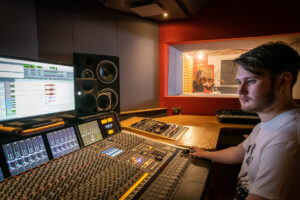
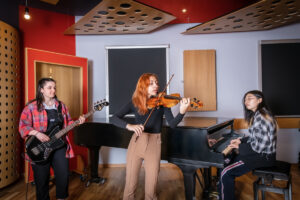
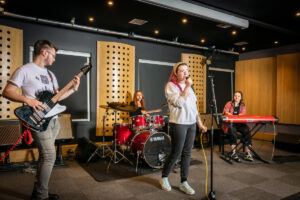
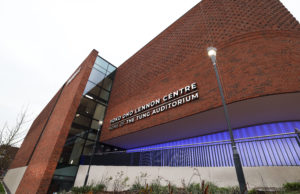
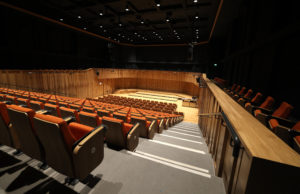

From arrival to alumni, we’re with you all the way:

The Music department at the University of Liverpool is friendly and welcoming and I felt that I could really fit in to that environment. I have felt so at home within this department that I have chosen to continue my studies in this department right through from undergraduate to PhD.

Want to find out more about student life?
Chat with our student ambassadors and ask any questions you have.
Studying music opens up many career opportunities. As well as jobs in music (from performance, composition, and production, through to teaching, music therapy and community arts), employers in many sectors are increasingly seeking arts and humanities graduates for their transferable skills.
As a music student you will achieve creative flair and imagination, confidence in expressing yourself, an openness to new ideas, a capacity for hard work and an ability to analyse data. You will learn the value of working with others towards a shared, finished product and a whole range of flexible, professional skills.
As a student in the School of the Arts, you will be supported to maximise your employability from day one.
The School has its own placements and employability officer, and you will have the opportunity to undertake the following work experience opportunities:
80% of music students will go on to work and/or further study 15 months after graduation.
(Discover Uni, 2018-19.)
Hear what graduates say about their career progression and life after university.
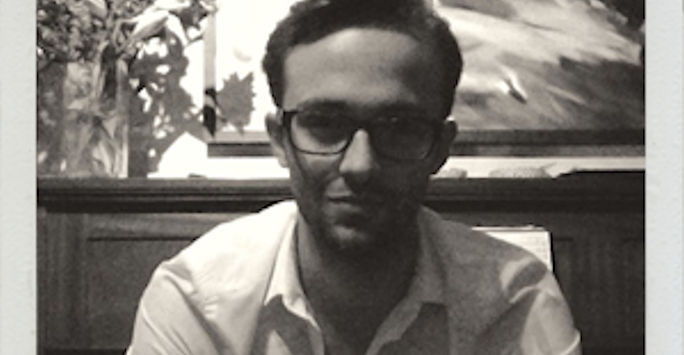
Jake graduated in 2014, and is currently studying for a masters degree in Composition and Conducting at the Guildhall School of Music and Drama, whilst working as a composer, music director and jazz musician. In the two years between graduating and beginning my MMus, I worked as a Composer and Music Director, specialising in music […]
Your tuition fees, funding your studies, and other costs to consider.
Full-time place, per year - £9,535
Year in industry fee - £1,905
Year abroad fee - £1,430 (applies to year in China)
Full-time place, per year - £24,100
Year in industry fee - £1,905
Year abroad fee - £12,050 (applies to year in China)
The tuition fees shown are correct for 2025/26 entry. Please note that the year abroad fee also applies to the year in China.
Tuition fees cover the cost of your teaching and assessment, operating facilities such as libraries, IT equipment, and access to academic and personal support. Learn more about paying for your studies.
We understand that budgeting for your time at university is important, and we want to make sure you understand any course-related costs that are not covered by your tuition fee. This could include buying a laptop, books, or stationery.
Find out more about the additional study costs that may apply to this course.
We offer a range of scholarships and bursaries that could help pay your tuition and living expenses.
If you’re a high-achieving international student starting an undergraduate degree with us from September 2024, you could be eligible to receive a fee discount of up to £5,000. You’ll need to achieve grades equivalent to AAA in A levels. Most of our undergraduate degrees are eligible, with the exception of clinical programmes in Medicine and Dental Surgery.
Completed a Kaplan Digital Pathways Foundation Certificate? We’re offering a £5,000 fee discount off the first year of undergraduate study for a maximum of two high achieving students joining one of our non-clinical degrees from an online Kaplan Foundation Certificate.
Apply to receive tailored training support to enhance your sporting performance. Our athlete support package includes a range of benefits, from bespoke strength and conditioning training to physiotherapy sessions and one-to-one nutritional advice.
Completed a Foundation Certificate at University of Liverpool International College (UoLIC)? We’re offering a £5,000 fee discount off the first year of undergraduate study to some of the highest achieving students joining one of our non-clinical degrees from UoLIC.
We’re offering a £1,000 fee discount for years 2 and 3 of undergraduate study to eligible students progressing from University of Liverpool International College. You’ll need to be studying a non-clinical subject and get an average of 70% or above in year 1 of your degree.
If you’re a University of Liverpool International College student awarded a Kaplan Impact Scholarship, we’ll also consider you for an Impact Progression Scholarship. If selected, you’ll receive a £3,000 fee discount off the first year of your undergraduate degree.
Use our handy chatbot for your Clearing enquiries.
Last updated 17 June 2025 / / Programme terms and conditions